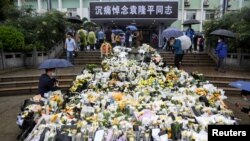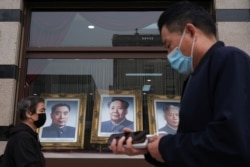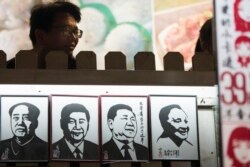On May 22, Yuan Longping, a renowned agronomist called the “father of hybrid rice” in China, died at the age of 90.
Yuan, whose rice varieties helped revolutionize global agriculture in the 1970s, was recognized outside of China for his contributions in fighting world hunger.
In 2004, he received the World Food Prize, an international award recognizing “the achievements of individuals who have advanced human development by improving the quality, quantity or availability of food in the world.”
Following Yuan’s death, China’s state-run news agency Xinhua ran a profile commemorating his life’s work.
Xinhua reported that in “over five decades in hybrid-rice research,” Yuan helped in “feeding nearly one-fifth of the world's population with less than nine percent of the world's total arable land.”
His passing was met with “an outpouring of mourning, gratitude and remembrance” across China, the agency said.
Xinhua claimed that Yuan, who was born in September 1930, had seen “with his own eyes" that people were not getting enough to eat.”
But then the report took a strange chronological turn.
"I saw heartbreaking scenes of people starving to death on the road before 1949," Xinhua quoted Yuan as saying.
The claim that Yuan spoke of witnessing those events before 1949 – prior to Chinese communist rule –is unsubstantiated. But there is clear evidence he made such remarks about The Great Famine, which killed tens of millions in Chinese communism’s early years.
The famine lasted for some 5 years (1958-1962), which followed the Great Leap Forward, a Communist party campaign, aimed at overtaking UK in terms of annual steel output. In numerous interviews over the years, Yuan recounted seeing people starving to death on the road in 1960, a sight that he said inspired him to develop new strains of rice.
The Xinhua article appears to be the first-ever mention of Yuan putting the starvation scene before 1949, the year communists gained control of mainland China, and leader Mao Zedong declared the People’s Republic of China.
The Xinhua profile did not mention the Great Leap Forward or the Great Chinese Famine, which resulted in tens of millions of deaths. The famine has been called “the greatest manmade disaster in history.”
A groundbreaking investigation of the event by former Xinhua journalist Yang Jisheng, titled "Tombstone: The Great Chinese Famine 1958-1962," found that institutional and ideological causes directly linked to Mao’s government were responsible for the mass deaths.
Yang concluded that 36 million people died of starvation during the famine, in addition to a “shortfall of 40 million births.” Some scholars put the death toll at 45 million.
Yang’s book was banned in China. Others say the toll was lower, but still large. In a 1989 study, Chinese researchers estimated 15 million died from malnutrition.
To be sure, there is a possibility Yuan encountered death and starvation prior to 1949. Yuan lived through both through the Second-Sino Japanese War (1937-1945) and the Chinese Civil War (1927-1936 and 1945-1949).
Both resulted in millions of deaths, atrocities, famine and starvation. For example, the Chinese Famine of 1942-43 is estimated to have killed 2 million to 3 million people in Henan province. In 1943, another 600,000 were estimated to have died of starvation in what is now Guandong province.
The 1948 Siege of Changchun resulted in up to 150,000 civilian deaths by starvation.
Yet it’s indisputable that Yuan frequently cited the Great Famine as an impetus for developing better types of rice with higher yields. He repeatedly mentioned seeing people dying of hunger during the calamity.
For example, in a 2007 report, now deleted from Xinhua, Yuan was quoted describing how he saw people starving to death on the road in 1960.
That report was republished by China’s state-run CCTV and remains online. It reads:
In 1960, natural and man-made disasters brought about a nationwide famine. Yuan Longping and his students also faced the threat of hunger. One day at noon, walking out of the school gate, he saw a group of people around the road from a distance. When he came near, there were two scrawny corpses lying on the side of the road, and the onlookers were all covered with sadness.
Yuan Longping witnessed the harsh reality and felt the sting of the word ‘starvation.’ He deeply realized that ‘food is the most important thing for the people,’ and he felt that he should and must do something about it.
A 2011 account by China Daily, an English-language daily newspaper owned by the CCP’s propaganda department, mirrors that account of events.
In an April 8, 2009, report from Guangzhou Daily, Yuan not only attributed the Great Famine to the Great Leap Forward, but also noted seeing people die as a result.
Yuan said:
Tens of millions of people died of starvation during the three-year difficult period. The Great Leap Forward chopped down all the trees to make steel and destroyed the ecology. In 1959, there was a major draught and basically no harvest for that year. And 40 to 50 million people died of starvation. I saw five corpses of starvation lying beside a crop field, under a bridge and on the roadside. I saw it with my own eyes. It was very miserable.
An item posted on the Chinese news portal Sina in 2014, headlined “Witnessing ‘Corpses of the Starved Everywhere’: Yuan Longping Determined to Make Hybrid Rice,” contained excerpts from a biography of Yuan. It included another account of Yuan seeing a crowd surrounding “two scrawny corpses” on the road in 1960.
That report noted it was the third time Yuan had “seen "corpses of starvation," having previously seen “two people fall from a bridge” and another person “fall by the side of the road” during the Great Famine.
In an interview available on YouTube, Yuan described seeing “with his own eyes” five people who had succumbed to starvation “during the three-year hard period” — a euphemism for the Great Famine.
On May 23, The Beijing News, a CCP-owned newspaper, also reported that Yuan had seen “five corpses of hunger lying down on the field ridge and the roadside” during “the three-year difficult period.”
It said “the memory of hunger” from the famine was “rooted in his mind,” which served to inspire his future work. "If the Chinese want to solve the problem of eating, the rice bowl must be in our own hands,” Yuan said.
Radio Free Asia (RFA), the Voice of America’s sister organization, lists other media reports corroborating that account. They include a 2013 interview with People Magazine in which Yuan recited his experiences with starvation during the Great Famine.
Prior to the recent Xinhua article, there are no known accounts of Yuan claiming to have seen “people starving to death on the road before 1949.”
Han Lianchao, a Visiting Fellow at the Washington-based Hudson Institute think tank, tweeted that his grandparents had died of starvation during the Great Famine “as described by Yuan Longping.”
“They all starved to death when they were living a hard life (again, a euphemism for the Great Famine). The two uncles died by the crop field on their way home. Before 1949, they had dozens of acres of paddy fields and two tea farm hills. For generations, they were educated farmers, abundant, comfortable, and never starved,” he wrote.
Polygraph.info reached out to Xinhua for clarification on the matter. Xinhua had not responded at the time of publication.
According to RFA, a 2018 law in China criminalizes any attempts to smear “the reputation and honor of the ruling party’s canon of heroes and martyrs.”
RFA said five people had been detained for posting derogatory comments about Yuan online following his death.
Yuan’s accomplishments, as well as public displays to honor his passing, are real.
Tens of thousands of people attended Yuan’s funeral to pay their respects.
Scenes from the funeral procession show tearful mourners braving the rain to say their goodbyes.
Voice of America's Mandarin Service contributed to this report.






